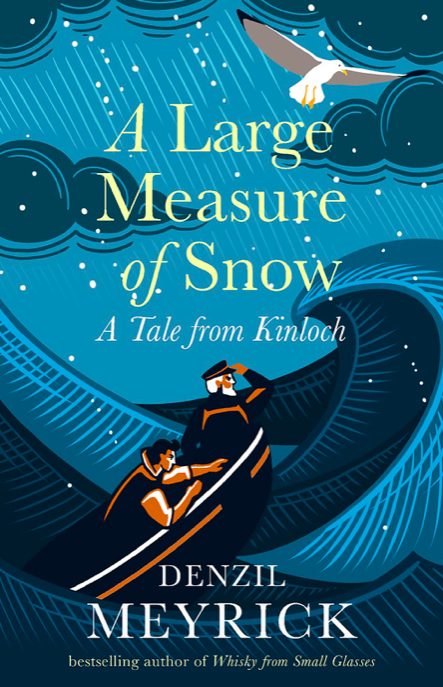More usually known for gritty crime writing Denzil Meyrick has taken a very different tack with his latest book. The story does feature settings and characters from the existing Kinloch series, but the tone is much lighter, more playful, and far more concerned with wry observations of mid-century Scottish rural life than criminal machinations and plots on the West coast.
Set in the fictional town of Kinloch, located on a particularly isolated part of Mull, A Large Measure of Snow, takes place in 1967, in the midst of one of the worst snow storms in memory. With the town in danger of running out of basic supplies it is up to the local fishing fleet to mount a rescue mission and sail through the bad weather. Meyrick keeps the reader’s focus on Sandy Hoynes – the best and prickliest fisherman in the loch, with one eye very much on how he can turn the natural disaster to his own advantage. Such an eye for a supposed advantage leads him to allow his first mate, Hamish, to bring a reporter on board, lured by both initial payment and the more distant dream of seeing his beloved vessel, The Girl Maggie, heavily featured in the national press. But the best laid plans live to fail – and the journey becomes far more perilous, and far more strange, than any of those onboard could have anticipated.
The language of the book is beautiful; a poetic tone thoroughly evokes the mood of the era, and the sense of place and the power of the weather is so well conveyed that one can almost feel the falling snow and the creeping cold mist seep out of the pages. The opening segment is especially powerful; an ageless gull gazes over the sheltered loch, silently narrating the steady and at times violent history of the sheltered cove.
Sadly, although the cast of characters is rich and highly varied, not all are especially enjoyable to read. The sketches of various fishermen and townspeople are lightly observed and beautifully realised, But Jo Baird, the Glasgow-based journalist who brings so much chaos to The Girl Maggie, and who the reader spends far more time with, has few redeeming qualities. Her actions drive the plot on the boat, but her motivations remain bafflingly obscure – and an almost total responsibility for near disaster does nothing to make her any less proud or particularly likeable by the end. It’s a shame – but such a cliched ‘heartless journalist’ trope doesn’t manage to ruin the overall charm of the book.
